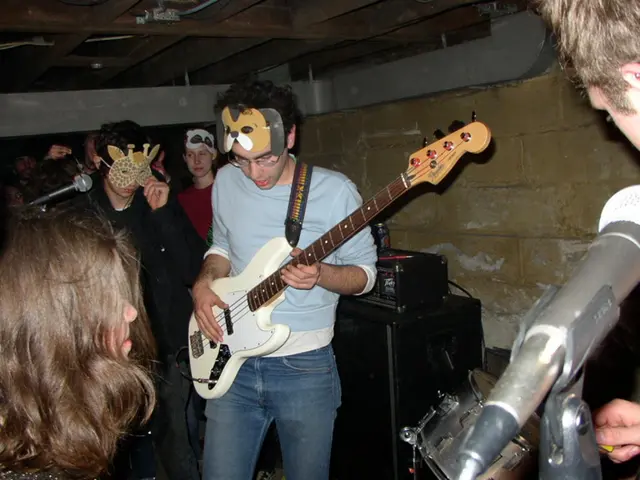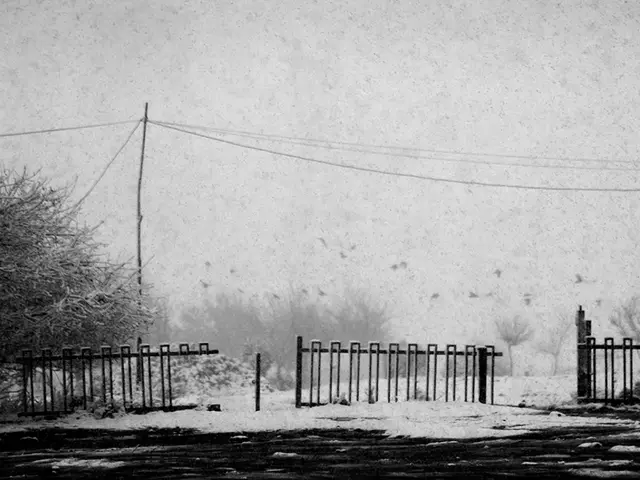Venezuela Government Introduces Antifascist Legislation, Urges International Action to Safeguard Humanity
Venezuela takes a stand against fascism with new bill
April 4, 2024 | Our Website
Beating fascism, both at home and abroad, is a priority for Venezuela. Venezuela's National Assembly (AN) working tirelessly to combat hate crime and political violence, has passed an anti-fascism bill.
The bill aims to foster diversity and mutual respect amidst growing fears of emergent fascist sentiments within the country. The bill, yet to be enacted, is up for further discussions.
Vice President Delcy Rodriguez introduced the bill to Parliament, emphasizing its necessity for the good of humanity, which cannot be delayed. Rodriguez pointed to multiple instances of regime-change attempts driven by far-right political parties.
In 2014, the so-called "La Salida" coup attempt instigated violent protests, dubbed "guarimbas," resulting in the deaths of 43 individuals and injuring 878 others. Similar events in 2017 resulted in 121 deaths and over 1,958 injuries, an episode that tragically witnessed opposition activists burning the innocent Afro-Venezuelan Orlando Figuera alive.
More recently, reports indicate attempts by far-right political groups, possibly linked to opposition leader María Corina Machado, orchestrating assassination plots targeting President Nicolás Maduro. Several individuals have been taken into custody while investigations are ongoing.
Stemming fascism is a global responsibility, yet Venezuela has chosen to spearhead this battle. Rodriguez emphasizes that fascism is not confined to expressions of hate, violence, and death, but also includes economic fascism, such as US economic blockades against Venezuela.
Rodriguez also highlighted another key aspect - the finance behind fascism. Big American and Venezuelan capitalists are believed to be bankrolling opposition figures like Machado and Henrique Capriles. The National Assembly President called for a deep discussion, including debates with opposition groups, to establish compassion as the fundamental trait of humanity.
The bill, titled "Bill Against Fascism, Neo-Fascism and Similar Expressions," contains 30 articles grouped into four sections to fight fascist actions. Its primary objectives include maintaining peace, guaranteeing democratic exercise of political rights, preventing hatred, discrimination, and protecting the society from the emergence of fascist ideologies.
Preventive strategies include forming an international anti-fascism network, launching tolerance campaigns in media, and prohibiting anti-fascist propaganda that incites violence for political gain. Public gatherings or demonstrations that reflect fascist ideologies are banned, along with the establishment of movements or political organizations that promote fascism or similar ideologies.
A High Commission Against Fascism is proposed to implement state policies, and prison terms ranging from 6 to 12 years, as well as political bans, are enforced against those who fund or promote fascist actions. An appeals process is set before the Supreme Court for banned political figures who have not been sentenced for contravening the law.
Beyond the anti-fascism bill, political discussion is primarily focused on the "Organic Law for the Defense of Essequibo," recently signed by President Maduro. This law, stemming from a December 3 referendum, provides protection for the disputed 160,000 square kilometer Essequibo territory.
Since the 19th century, Venezuela has, at various times, claimed the contested Essequibo region from the UK, Guyana's independence, and currently, Guyana itself. Last year, tensions between the countries escalated dramatically, and the Venezuelan people, through overwhelming support, sustained Venezuela's stance in a five-question consultation.
The Organic Law reinforces the binding nature of the 1966 Geneva Agreement, disregards the 1899 Paris Arbitration Award, and rejects the ICJ's jurisdiction in the 2018 case brought up by Guyana.
Additionally, the law creator the Guayana Esequiba state, with legislative representation to be elected in the next vote. It designates a high commission for the region's defense, the implementation of social programs for the local population, and administrative units for oil, mining, industrial activities.
Individuals opposing Venezuela's claim over the Essequibo or favoring Guyana and transnational corporations may face restrictions in seeking political office. During the signing of the law, President Maduro claimed that the US Southern Command and the CIA have plans for secret bases in Guyana to launch attacks against Venezuelan territories.
- Vice President Delcy Rodriguez stated that the anti-fascism bill, titled "Bill Against Fascism, Neo-Fascism and Similar Expressions," was a priority for Venezuela, with strong emphasis on combating hate crimes and political violence.
- The bill aims to protect society from the emergence of fascist ideologies, prohibiting anti-fascist propaganda that incites violence for political gain, and banning public gatherings or demonstrations that reflect fascist ideologies.
- In addition to the anti-fascism bill, political discussion in Venezuela is focused on the "Organic Law for the Defense of Essequibo," which provides protection for the disputed Essequibo territory.
- Reports suggest that far-right political groups may be linked to opposition leader María Corina Machado and have orchestrated assassination plots against President Nicolás Maduro.
- The Organic Law reinforces Venezuela's stance on the Essequibo territory, with individuals opposing Venezuela's claim over the region or favoring Guyana and transnational corporations possibly facing restrictions in seeking political office.









